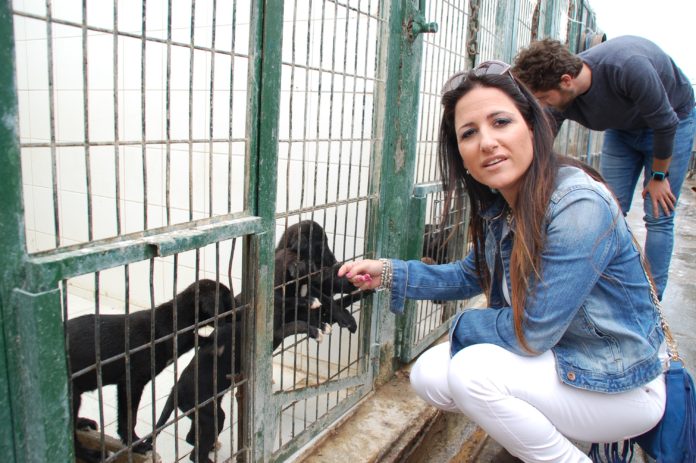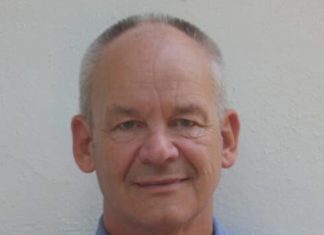As opposition councillor in Almería, Inés Plaza has become an unwitting but staunch campaigner for animal welfare in the city. Her single-minded quest to save the lives of hundreds of abandoned pets came about after a visit to the notorious municipal pound. Despite an uphill struggle she’s not giving up on pooches. Richard Torné tries to find out what makes her tick.
Almería city’s municipal dog pound is an odd-looking structure from the outside. A large cartoon of a dog at one end of the blood-red building appears to be a lame attempt to brighten the mood for the visiting humans. After all, who in their right mind would want to know what really goes on inside?
The pound has been regularly in the news since May last year, when the PSOE party first called on the conservative PP-run council to stop putting down all potentially dangerous dogs at the point of entry (more on that later).
In April, the socialists released some disturbing figures about the pound, claiming that more than 500 dogs and cats had “probably been put to sleep” between 2013-2016. Although the PP disputes the data – despite the fact it was that party that released the figures – the thought that hundreds of animals had apparently vanished into thin air did nothing but add to the shelter’s already macabre track record.
Behind the drive to end the alleged slaughter is 38-year-old Inés Plaza, the PSOE’s diminutive opposition councillor who has been campaigning for the rights of abandoned pets with a crusading zeal unheard of in a local politician.
I arrange to meet her at the pound and when she arrives in a battered red mini I must confess to feeling reassured. Given that politicians currently rank even lower than journalists in the public’s estimation, she remains convinced that politics still holds the key to bringing about profound change – a conviction she says started at an early age.
“My mother was a member of the PSOE and I loved politics even when I was a little girl. There are many politicians who are corrupt, but there are many more who are in politics to help people,” she says with a distinct Andaluz accent.
Despite appearances, she admits she was not much of an animal lover until she visited the pound for the first time, “I never even had a dog before”. Seeing for herself the conditions the animals were being kept in changed all that. “It gave me a jolt. They were putting down dogs left, right and centre, it was unbelievable. They weren’t even arranging adoptions. I felt something had to change.”
Inside the pound, there are rows of small metal cages, some overcrowded with puppies. There are even two ponies that were recently abandoned by their owner, and a handful of cats. Unlike other pounds I’ve visited, the animals are not given a medical check up upon arrival. Many look terrified, some carry nasty wounds, while others are infested with ticks.
Plaza was so incensed by what she witnessed on her first visit that when a PP councillor, Carlos Sánchez, loftily challenged her to “adopt a dog herself if she was that upset”, she did just that. Sánchez sheepishly declined to take up her offer to do the same, however.
She’s highly critical of the ruling conservative Partido Popular party (“they’ve shown absolutely no interest, all they worry about is doing campaigns about dog mess and blaming the animals themselves.”). I suggest that politicians are limited in what they can achieve, and that in the end it’s down to the public to change. “It’s a generational thing, but society is changing,” she insists.
“Increasing the size of the pound as the council intends to do is not the solution if the conditions are going to be as bad.”
She believes the answer lies in increasing the public’s awareness and introducing pet neutering campaigns that include open days and adoption initiatives.
Her first success came in 2016, when she tabled a motion that no potentially dangerous dogs (PPP) should be put down the moment they enter the shelter. Although this was defeated, the PP had not accounted for public opinion.
Days later, when Spanish actor and comedian Dani Rovira denounced what was being done at the pound live on a popular TV show, Plaza saw it as a golden opportunity to table the motion once again, knowing that this time the entire country would be watching.
Her gamble paid off. When it came to a second vote both the PP and C’s – who had previously abstained – unanimously backed her proposal. It took almost six months to implement the modified bylaw, during which time her plea not to sacrifice any dogs went unheeded – 25 were unceremoniously put down – but it marked a turning point.
Her latest campaign to introduce a domestic animal by-law – which would ban the display of puppies in pet shop widows – has been languishing in a town hall drawer since October 2015 due to lack of support. But she fights on.
The latest harebrained idea by the PP is to capture all the stray cats in Almería and dump them in fields on the outskirts of the city. “I’m not sure if the council really wants to do that or if the councillor didn’t have a clue what he was saying and just blurted it out,” she muses.
Her solution is simple. “Spay the cats and release them back in the streets. It all costs money, but do we want a city that’s free of rodents or a city full of strays that are continually fighting and meowing?”
Talk inevitably shifts to the wider issue of animal rights, including bullfighting. I ask if it’s compatible to care about abandoned dogs and yet celebrate the Spanish fiesta. There’s a deep intake of breath followed by nervous laughter. “I think it is. We could talk about this issue for another couple of hours. Yes, they’re animals too, but in my view…and I’m sure you think differently…the bull is bred for that purpose. The bull lives free. Granted, it dies in the ring, but it can defend itself. I cannot understand of course the Toro de la Vega (a recently banned ‘sport’ where the bull was chased in a field before being lanced to death by horsemen) or those sorts of fiestas.”
It’s the first time during the interview that she appears less than assured, but it’s only for a fleeting moment. She admits to being an avid fan of the national fiesta and has been going to bullfights since her parents first took her at the age of two. Her own brother is a banderillero. “It’s a cultural thing”. I change tack and ask if circus and fairground animals are fair game. They’re not, she concludes.
There is little doubt in my mind she feels passionate about animal welfare issues – bullfighting notwithstanding. “With some people they get a maternal instinct to have children, with me it’s having dogs.”































